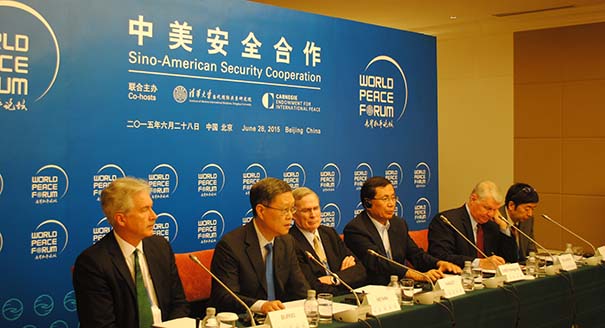Registration
You will receive an email confirming your registration.
China and the United States play critical roles in maintaining global and regional peace, security, and prosperity. However, disagreements and misunderstanding hinder relations between the two countries on multiple issues, including security matters in the Asia-Pacific region.
Carnegie Endowment President William J. Burns moderated a panel of leading Chinese and U.S. experts to discuss how the two countries can cooperate on security issues and enhance mutual trust to strengthen bilateral relations and maintain regional peace and stability.
Discussion Highlights
- Economic Interdependence: As the Chinese and U.S. economies become increasingly intertwined, it is crucial for the two sides to maintain a stable and constructive security relationship, panelists agreed. They discussed ways to enhance economic cooperation by advancing World Bank and IMF reforms and working in concert through emerging initiatives such as China’s One Belt, One Road plan. Participants also conceded that trade alone cannot guarantee a stable geopolitical balance between the two countries. In fact, strategic mistrust has grown even as trade volumes have increased. They concluded that regional trade talks should be conducted inclusively to ensure that all regional actors benefit.
- Mounting Distrust: Panelists observed that U.S. misgivings about the China-led Asian Infrastructure Investment Bank and disagreements involving the South China Sea are hindering trust between the two countries. Chinese panelists indicated that many people in China feel that the United States seems to be adopting a strategy of hedging against their country. In Washington, meanwhile, uncertainty about China’s long-term aims has sparked active discussion about how the United States should respond. Participants concluded that both countries must continue to make it a priority to promote constructive bilateral ties.
- U.S. Alliances in East Asia: Participants identified U.S. regional alliances as a key factor that has prompted Chinese misgivings about the U.S. pivot to Asia. U.S. panelists reiterated that Washington and its allies have no intention of attempting to contain or constrain China, arguing instead that the U.S. rebalance is a multifaceted strategy that includes economic and diplomatic components in addition to its oft-cited security dimension. Chinese panelists expressed displeasure toward what they described as a U.S. tendency to side with its allies in regional maritime disputes. They also asserted that U.S. military exercises and surveillance activities near Chinese territory were potentially destabilizing. Panelists acknowledged the validity of both sides’ concerns, agreeing that both countries must deftly balance their bilateral relationship and diplomatic ties with other regional actors.
- South China Sea: U.S. panelists suggested that Chinese island reclamation efforts in the South China Sea have important implications for regional freedom of navigation. Chinese panelists offered assurances that China will uphold the principle of open transport in these waters. U.S. and Chinese participants agreed that the two countries have different interpretations of the UN Convention on the Law of the Sea—China’s position is that waters within a country’s exclusive economic zone are not international waters, a stance which the United States does not share. Despite current tensions, participants also expressed optimism that the upcoming summit between Presidents Xi and Obama is an opportunity to achieve progress toward a set of guidelines for navigation in international waters that both sides will be amenable to.
- Military Cooperation: Several panelists emphasized the importance of candid bilateral communication between U.S. and Chinese military leadership on a regular basis. One participant asserted that these channels should be insulated from political fluctuations in the bilateral relationship. U.S. panelists suggested that joint military exercises and disaster relief efforts may help to build strategic trust over time. Chinese panelists agreed that strong military-military connections are vital to the overall bilateral relationship, but also suggested that concrete actions are an important sign of enhancing trust. All participants concluded that educating young officers about the virtues of military transparency and direct, informal dialogue is an important shared interest.
William Burns
William Burns is president of the Carnegie Endowment for International Peace. He previously served as U.S. deputy secretary of state.
He Yafei
He Yafei is the vice minister of the State Council’s Overseas Chinese Affairs Office. He previously served as representative and ambassador of the Permanent Mission of China to the UN Office at Geneva.
Stephen Hadley
Stephen Hadley served as national security adviser under former president George W. Bush. He is currently the principal of RiceHadleyGates, an international strategic consulting firm.
Chen Xiaogong
Chen Xiaogong is a member of the Foreign Affairs Committee of the National People’s Congress. He previously served as deputy commander of the People’s Liberation Army Air Force.
Gary Roughead
Gary Roughead was the U.S. chief of naval operations. He previously commanded both the U.S. Atlantic and Pacific fleets.
Li Bin
Li is a senior associate working jointly in the Nuclear Policy Program and Asia Program at the Carnegie Endowment for International Peace.
